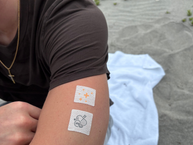Vitamin D may have been a bit of an unsung hero historically, but that is changing fast. Vitamin D is needed for bone health, proper immune function, and even healthy skin and heart. Seasonal deficiencies of vitamin D can happen because levels tend to be lower during winter.
But there are ways you can try to fight this. A smart diet and getting sunlight when you can are a good start, but they may not be enough. Vitamin D supplements, such as from PatchAid patches, may be necessary to keep your levels up. These are some tips for avoiding vitamin D deficiencies in winter.
VItamin D Sources
Vitamin D is naturally found in fatty fish and cod liver oil. Smaller amounts are in eggs. Irradiated mushrooms, and some fortified foods, such as milk and some cereals, also have vitamin D. But you may not get enough just from food. Instead, exposure to radiation from the sun can trigger the process in your body that makes vitamin D.
Vitamin D Seasonality
The trouble is that sunlight during the winter is less intense than in the summer. And in many climates, the amount of radiation during winter months just is not enough for your body to produce enough vitamin D to keep your levels optimized. Climates above a latitude of around 42 degrees north (around the level of Boston) do not get enough UV radiation from the sun from November until March. You may find yourself choosing between vitamin D deficiency and vitamin D supplementation.
Checking Vitamin D Levels
Unlike with some nutrients, it is easy to check levels of vitamin D. It just takes a simple blood test. You can ask your doctor for a referral and get it done in any standard lab. If your levels are low, ask your doctor how to get them back up. PatchAid Vitamin D3 patches may be the best answer for you.
Vitamin D Patches
Many PatchAid Patches contain vitamin D3. The Multivitamin Plus Patch has 5000 IU of vitamin D3, or about as much as in many vitamin D3 capsules or chewable tablets. If your doctor is especially worried about bone health as well, she may suggest the Vitamin D3 and Calcium PatchAid Patch, which also contains vitamin K2 and magnesium, to support bone strength.
Whichever PatchAid Patches you choose, they are easy to use. You can use them day or night without worrying about timing them around meals. They will not cause stomach discomfort or give you an unpleasant aftertaste. Just wear them for 8 hours a day and discard them when you are finished!
Keeping up your vitamin D status during winter is needed for optimal health, and vitamin patches can contain plenty of this essential nutrient. If you have concerns over your vitamin D status, it is best to ask your healthcare provider for a test and to explain your worries. Also ask whether PatchAid Patches may be appropriate for you as you try to get your levels back up without worrying about swallowing capsules every day.







